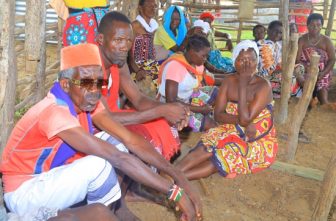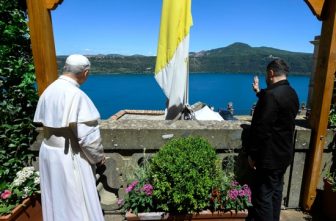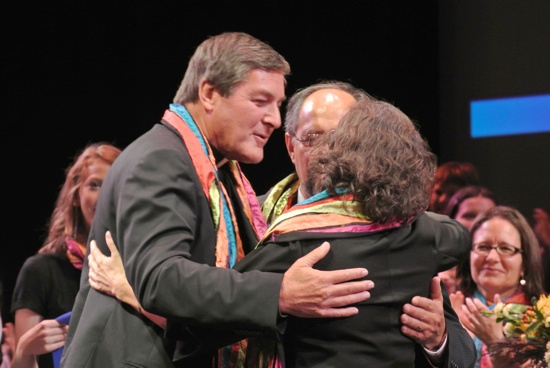
The $1 million Opus Prize was awarded to Passionist Father Richard Frechette, founder of the St. Luke Foundation for Haiti, in a ceremony at St. Catherine University in St. Paul Nov. 8.
St. Luke Foundation is a Haitian-run organization, started by Father Frechette in 2001, that provides education, medical care and humanitarian outreach to more than 150,000 people each year. The organization employs more than 900 Haitian staff.
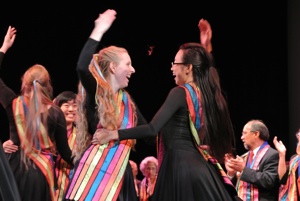
The award capped off an evening of music, dance and reflections on the work of the prize’s three finalists.
During his acceptance speech, Father Frechette talked about how the passion to make the world a better place has been passed down throughout history and continues today.
“Our savior begot the huge great work of God, an opus . . . to restore a fallen world, to renew a hurt creation and to show everyone the way to eternity and to paradise. And then that work was entrusted to you and entrusted to me,” Father Frechette said.
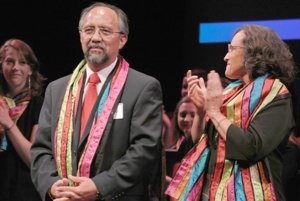
Sister Andrea Lee, IHM, president of St. Catherine University, announced Father Frechette’s award along with prizes of $100,000 to each of the other finalists: Segundo Velasquez of Mano a Mano International Partners, based in Mendota Heights, Minn., and Bolivia; and Leonora Micheiln Laboissière Mol of Ateliê de Idéias (ADI), an nongovernment organization based in Vitoria, Brazil.
Mano a Mano — through counterparts in Bolivia and support from the U.S. — has built 130 clinics and 45 schools, airlifted more than 1,400 critically injured or ill patients to lifesaving treatment, and regularly sends volunteers and donors from the U.S. to see it projects in action.
Ateliê de Idéias has strengthened the lowest-income communities in Brazil through life skills development, financial literacy and empowerment and housing development. The organization also operates a bank that serves residents who otherwise would not have access to traditional banks.
Awarded annually since 2004, the Opus Prize acknowledges individuals and their organizations that are largely unsung yet provide exceptional and unique responses to difficult social problems in the world’s poorest communities, according to the organization’s website, Opusprize.org. All three awards were given to help the organizations advance their missions
For more information about St. Luke Foundation, visit Stlukehaiti.org.
Student reflections
Last spring and summer, St. Catherine University sent three due diligence teams — including students, faculty members and staff — to visit the finalists, learn about their work and make final recommendations. Excerpts of their reflection on the experience appear below.
Ateliê de Idéias
Founder, Leonora Michelin Laboissière Mol
Joanne Sienko Ott
Graduate student at St. Catherine University
Maryknoll lay missionary
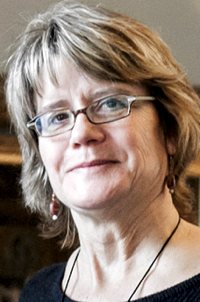
It was a tremendous honor to represent St. Catherine University as a graduate student on the due diligence team that traveled to Vitoria, Brazil to evaluate Ateliê de Idéias and its founder, Leonora Michelin Laboissière Mol, following the organization’s nomination for the Opus Prize.
ADI was created to provide low-income communities in Vitoria — a city of more than 300,000 residents — with life skills, financial literacy and housing and also operates a bank that serves residents with no access to traditional banks.
Mol’s empowering vision of economic inclusion for all humanity through community development banks is the next frontier of social justice in empowering humanity to construct inclusive economic systems.
ADI’s whole-community development bank model is unique to Brazil. It empowers residents of economically-challenged communities to construct their own inclusive economy, including the use of social currencies to stimulate local business growth within these communities.
In one of the due diligence team’s conversations with Mol, she conveyed with great intensity that in all the years she had worked in organizing residents in the favelas (slums), it was community development banking that has had the biggest positive impact. Economic inclusion — with their own elected leaders making the decisions — was the essential grounding component of her vision.
We have to pay attention to the fact that our economic system that operates well in one situation, based on certain assumptions, may not do so well in another situation. As such, our economic system has been constructed to fit certain parameters that may not hold true for everyone. Then why can’t the poor construct their own hybrid economic system?
The part that challenged me the most about this experience is how faith is quantified. It seems to me that faith can be defined in various manners. My faith is rooted in social justice that gives dignity to all humanity and is expressed in outward action versus expressed words — I embody faith not verbalize it.
During my previous experience in Brazil, I learned that people — through their own interpretations and awareness — can be empowered to overcome whatever oppression or injustice they are experiencing.
What I observed in Leonora’s work is faith in action, transformative leadership, and empowerment of people to construct their own change with her organization.
Mano a Mano
Founder, Segundo Velasquez
Renee Crepeau
Senior at St. Catherine University
Student Senate president
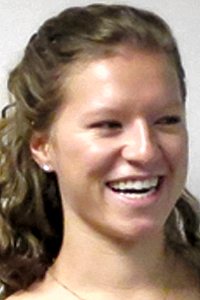
A few months ago, I was invited to travel with the Opus Prize Foundation on behalf of St. Catherine University to evaluate the work of Mano a Mano, a humanitarian organization collaborating with the people of Bolivia to provide medical care and education as well as roads and other infrastructure projects.
In my time in Bolivia, I learned much about the people, the culture and how this organization was making the lives better of those that they touched. These were all things that I had expected to experience; however, I did not expect to experience the overwhelming joy and happiness that some of the poorest people in the world would share with me.
One of the most compelling stories taught me the value of gratitude. One of the villages I visited was one that Mano a Mano had recently built a road for. This road now enabled a truck that went to market each week to pass by their rural village and give them the economic opportunity to sell their goods at a market miles from their home. They were most grateful for the road and were asking for a bridge, because during the rainy season, the nearby riverbed floods and becomes impassable. In fact, a young mother and her son from the village died trying to cross it.
It struck me how we — here in Minnesota — consider the construction of roads or bridges an inconvenience. Either we are stuck in traffic, or forced to take a detour and gripe because we’re late for an appointment due to construction.
Ultimately, our trip will be easier and faster once the project is finished, but in the meantime, we are ungrateful and impatient for the improvement and just want them to be finished.
In developed countries, it’s easy to take for granted roads and bridges, but in developing countries, they aren’t as common.
This experience taught me that although we may encounter a situation in our lives when we aren’t sure what we can do for those in need, or feel helpless because we wish we could do more, the most important thing we can do is to share their story with others. Everyone has a story, and by passing on their story, no one is forgotten.
St. Luke Foundation
Founder, Father Richard Frechette
Jennifer Donohue
Sophomore at St. Catherine University
Double majoring in social work and public health
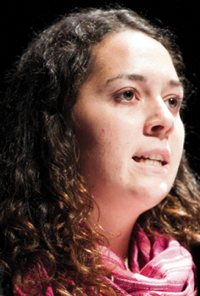
Last March, I was blessed with the opportunity to go to Haiti to visit the St. Luke Foundation and meet its founder, Father Richard Frechette. The work we saw being done there was incredible.
His foundation grew as an offshoot of Nuestros Pequenos Hermanos, otherwise known as N.P.H .International. This organization serves orphaned children in nine different Latin American countries, including the Haitian home to which Father Rick was initially assigned. As Haiti is one of the most impoverished countries in the Western Hemisphere, Father Rick quickly realized that the NPH home would not be enough to create social change and created The St. Luke Community Outreach Foundation.
From the St. Damien Pediatric Hospital to schools, kidnap rescue missions, food production sites and distribution programs, prosthetic limb production and physical, visual, sound and art therapy, every need that arises receives attention and is addressed despite a lack of resources.
While these programs are extraordinary, it is the faith, hope and love reverberating from everyone involved that gives soul, life and meaning to the work. Local Haitians, who know the significance and value of these programs because they directly affect the lives of their children, family members and friends, run these programs.
There is simply no way to explain what it’s like to attend a funeral Mass every morning, with the question not being “did anyone die at the hospital last night” but rather, “how many this time?” There is no way to explain the feeling of a dead baby in your arms, knowing full well that there will be more deaths the next morning that could have been prevented if life was fair. There is no way to explain the desperation in the eyes of starving children and adults — the majority of whom live on less than a dollar a day and have never escaped hunger. There is no way to explain the full implication of a heavy rainfall that washes away people’s few possessions and spreads waves of cholera throughout the city because of polluted, garbage-ridden streets.
Words can never do justice when explaining the emotions and complexities of life, let alone the contrast between Haiti’s harsh conditions and the overflowing/abundance of faith, hope and love the Haitians exhibit.
I can simply say that the work being done at the St. Luke Foundation is incredibly needed, and uplifts the dignity of thousands of people every day. While Father Rick facilitates the outcomes of these programs, it is ultimately community members who maintain and create jobs, celebrate and honor the sacredness of life, create opportunities for education and success, and raise their community out of poverty and toward self-sustainability.
These experiences in Haiti have inspired me and give me hope for the future. The St. Luke Foundation has taught me that through faith, hope and love — together we can persevere and navigate the unknown, and find beauty despite horrendous and inexplicable events that occur every day.



